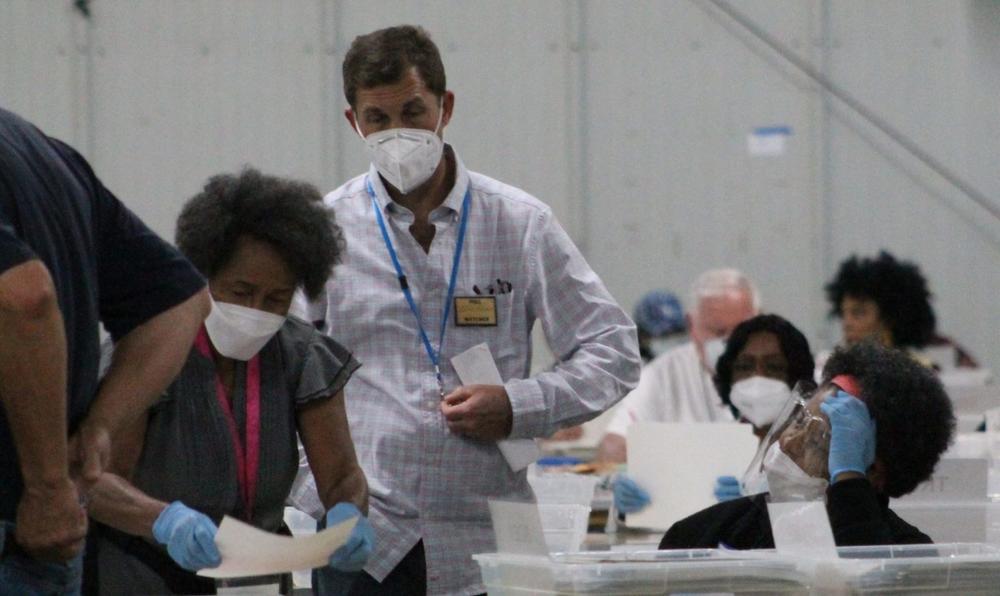
Caption
A poll watcher, designated by the yellow badges, interacts with an elections worker.
Credit: Laura Corley/The Current

A poll watcher, designated by the yellow badges, interacts with an elections worker.
More eyes were watching Georgia’s ballot counting process in person this year as Democratic President Elect Joe Biden defeated President Donald Trump in a razor-thin margin.
Whose eyes were watching? It’s tough to say.
Georgia law allows poll watchers credentialed by political parties to observe while votes are tallied. The names of these observers are, in theory, part of the public record, but neither the Democrats nor Republicans have released the lists of observers present for the state’s first-ever limited risk audit of paper ballots after the Nov. 3 election.
The lack of transparency has added fuel to hyperpartisanship rhetoric and rampant misinformation that has left some voters struggling to understand which of the state’s political leaders to trust and whether to trust the voting system at all.
For Secretary of State Brad Raffensperger, the opaque rules led to major headaches this fall.
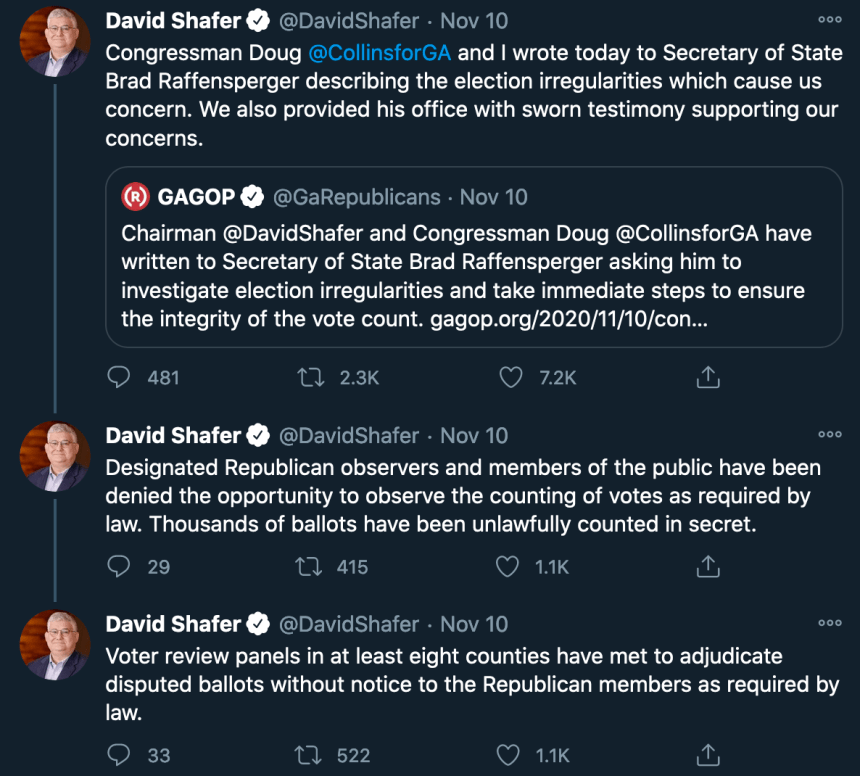
Tweets from Georgia GOP Chair David Shafer on November 10, 2020 alleging lack of access for some poll watchers.
Charges by several Republican poll watchers about alleged fraud led to a wave of lawsuits by the Trump campaign. Meanwhile, cries from Republican Party Chairman David Shafer on Nov. 10 alleging a lack of access for some party poll watchers left top election officials scrambling to find out who he was talking about and whether any wrongdoing occurred.
However, there is no centralized department that collects information on poll watchers in Georgia, even Raffensperger’s own office, making it difficult to confirm Shafer’s allegations. That sparked calls from inside the secretary of state’s office to firm up how the process works — and who should be held responsible for its shortcomings.
“Voters of GA deserve to know who is managing the monitor programs- and it’s the parties,” Raffensperger tweeted Nov. 13 along with emergency red light emojis beside American flags.
Poll watchers are allowed to monitor vote counts in Georgia as part of a check-and-balance system to ensure elections are free and fair.
The process works like this: Parties send letters before the election to each county where a poll watcher will be present. On the day of the election or tabulation, the poll watcher presents the letter to the local elections office, signs and takes an oath, then is issued a name tag to be worn at all times during the process.
Poll watchers are prohibited from speaking to poll workers, interfering with votes, taking pictures or disrupting the process in any way among other rules the senior election official in each county is charged with enforcing.
Yet no state official monitors how this process plays out across the state. That is left up to election workers in Georgia’s 159 separate counties. For members of the public or campaign lawyers interested to know who was monitoring ballot counting, it would take 159 separate open records requests and an untold amount of time to compile a list of names.
Through Georgia’s vote tally and recounts, some poll watchers have disrupted the counting, rather than facilitating it.
In Chatham County, there is no record of who was present as a poll watcher on election night. The county board of elections should have accreditation letters sent by the parties for each observer, but it’s unclear how many the county received. County officials did not respond to a request for those accreditation forms sent by The Current one month ago.
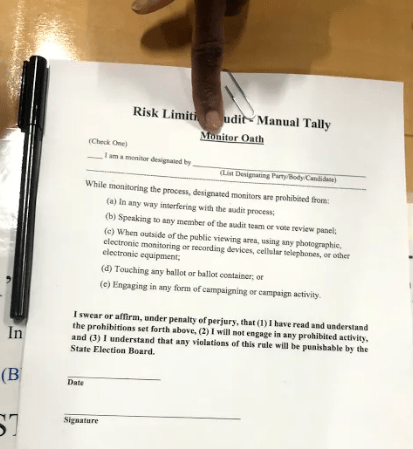
In Chatham County, poll watchers and nonpartisan monitors were asked to read and to sign an oath to view the count process.
One of the poll watchers on Election Day in Chatham County was from South Carolina and was a registered poll watcher for the Republican Party of Richmond County in Georgia.
He and another Republican poll watcher said in a sworn affidavit that they saw questionable behavior by county election workers. Their testimony that led to the Trump campaign’s first lawsuit in Georgia — and the campaign’s first court challenge dismissed in Georgia.
That lawsuit was the first of eight to be filed in Georgia after the election by the state GOP and Trump campaign. Three of them have been dismissed, according to Democracy Docket, a platform created by Democrat lawyer Marc Elias that spotlights laws and practices that restrict the right to vote.
During the state-ordered audit of presidential ballots, the Carter Center was the only nonpartisan group that had observers watching this tally. Its Democracy Program deployed 68 monitors to 28 counties including Chatham County.
In many locations, Republican Party-affiliated poll monitors outnumbered those from the Democratic Party, the Carter Center said.
It documented several instances where the behavior of Republican monitors was “perceived as potentially intimidating to audit workers, or where it became more aggressive,” according to a preliminary report to the secretary of state’s office.
In a small number of cases, problematic observers were escorted from the building. In four counties, which the Carter Center did not name, such disruptions caused ballot counting to pause, according to the report.
In Chatham County, one or two poll watchers through the entire ballot counting process “were mildly problematic,” Elections Supervisor Russell Bridges said.
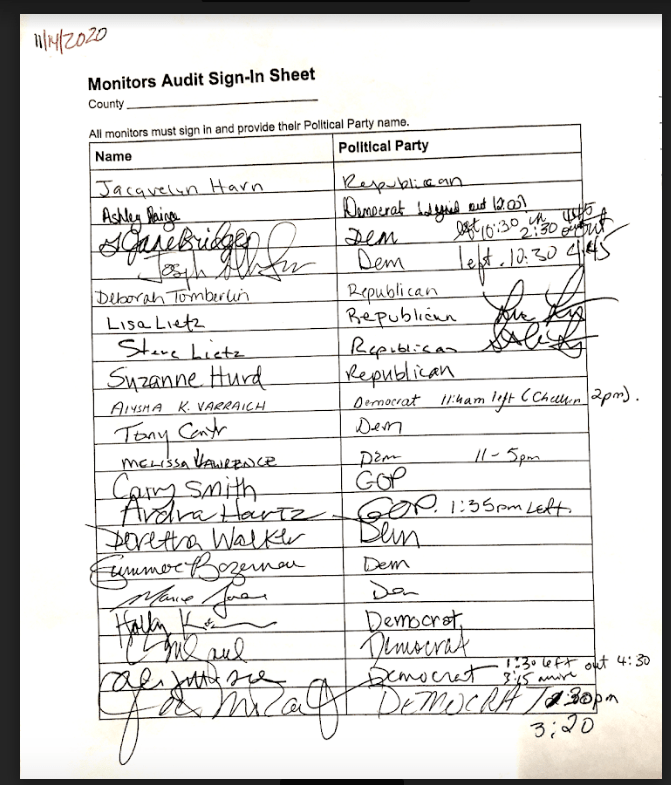
Poll watchers signed in and out of a secured area during the audit on Nov. 14, but some signatures were illegible.
During the audit process, the second tally of votes, poll watchers spoke to the county officials counting ballots at a table, despite a prohibition of that behavior. “They got a little abrasive and a person from the Republican group that was there was sort of acting as a buffer,” Bridges said.
Bridges did not name the disruptive observers, who he said left after the kerfuffle and were not seen again. Anyone could walk in and watch the tally from the public observation area, but a sheriff’s deputy stood by the entrance to the area where votes were being counted. Poll watchers were instructed to sign a log by the to document entry and exit to that area. Even so, some signatures were scrawled and illegible, making it impossible to verify who they were. Others didn’t bother to sign out.
In Georgia, political parties are responsible for preparing poll watchers on how the process works and training them on how to be an effective observer. After all, party monitors are really supposed to look out after their party and their candidates.
The Carter Center report states partisan poll watchers appeared inconsistently or poorly trained on how the state’s limited risk audit works. It’s the first time Georgia has had a hand recount of paper ballots produced by the new voting machines.
What’s more, few poll watchers appeared to be collecting or recording any information about what they witnessed to make suggestions on how it could be improved, said David Carroll, director of the Democracy Program.
“It’s a missed opportunity if there’s observers who are doing all this work and they’re not really systematically gathering their information and pulling it together in some kind of summary report with recommendations” to improve the process, Carroll said. “Some groups just look for problems that they can report and maybe file a lawsuit … or maybe they’re looking to disrupt.”
Poll workers, elections board members and even the Secretary of State have had their lives threatened since the Nov. 3 election.
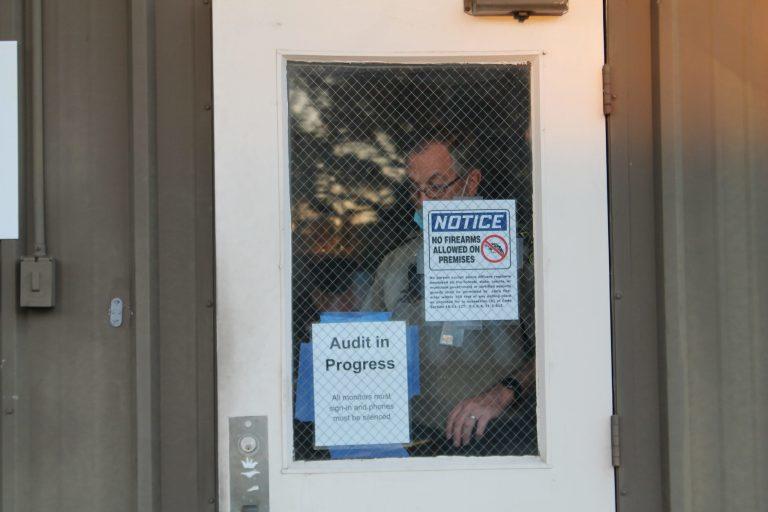
Chatham officer tapes a warning sign to notify audit observers that guns are not allowed inside the warehouse where paper ballots were being counted by hand in mid-November.
As votes were still being counted two days after the election, a Chatham County elections board member received several threatening phone calls. The caller said, “you’d better stop counting those illegal votes.”
In Fulton County, a poll worker had to go into hiding after an unnamed person in the absentee ballot processing area Tweeted a video of him throwing away some paper. The unnamed narrator said the poll worker was discarding a ballot.
“He was merely discarding a list of instructions that had been put into one of the envelopes,” Fulton County Elections Supervisor Richard Barron said in a news conference. “The only thing you do at that station is separating the envelope and opening them.”
The poll worker’s personal information, including his home address and car license plate number, was published online. He had to shut down his social media accounts amid death threats and harassment.
Only poll workers and credentialed poll watchers are allowed in the area where the video was taken.
“Personally, I think it’s shameful,” Barron said.
Even so, President Donald Trump continues to Tweet false allegations of skullduggery and widespread fraud all while insisting he won.
This story comes to GPB through a reporting partnership with The Current, providing non-partisan, solutions-based investigative journalism without bias, fear or favor with clear focus on issues affecting Savannah and Coastal Georgia.
